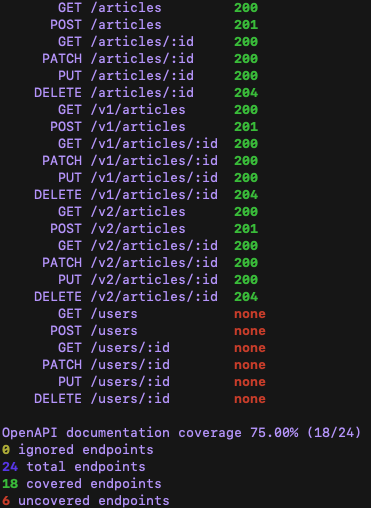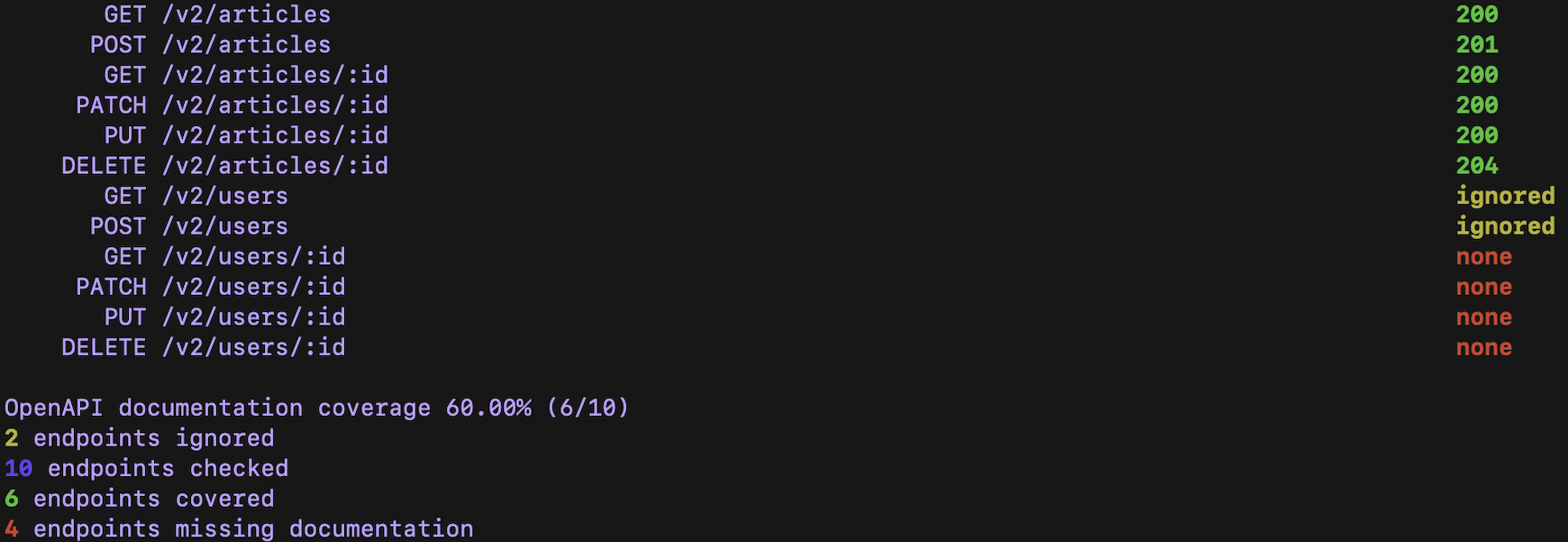Swagcov
OpenAPI documentation coverage report for Rails Routes.
Usages
- See overview of different endpoints covered, missing and what you choose to ignore.
- Add pass/fail to your build pipeline when missing documentation coverage.
Usage Options
swagcov can be used with a few different approachs.
The approaches below are listed in the following order:
- via executable
- via rake task
- via rails console
View OpenAPI documentation coverage report for Rails Route endpoints
swagcovrake swagcovSwagcov::Runner.new.run
Generate required .swagcov.yml config file
swagcov --initrake swagcov -- --initSwagcov::Runner.new(args: ["--init"]).run
Generate optional .swagcov_todo.yml config file
swagcov --todorake swagcov -- --todoSwagcov::Runner.new(args: ["--todo"]).run
View swagcov version
swagcov -vrake swagcov -- -vSwagcov::Runner.new(args: ["-v"]).run
View command line usage options
swagcov --helprake swagcov -- --helpSwagcov::Runner.new(args: ["--help"]).run
Environment Variables
The following default environment variables are automatically set (and can optionally be changed to your needs)
| Key | Value |
| :— | :— |
| SWAGCOV_DOTFILE | .swagcov.yml |
| SWAGCOV_TODOFILE | .swagcov_todo.yml |
For example SWAGCOV_DOTFILE=".openapi_coverage_config.yml" bundle exec swagcov
Exit Codes
swagcov exits with the following status codes:
0- (success) if no missing documentation coverage is detected1- (offenses) if missing documentation coverage is detected2- (error) if abnormal termination due to invalid configuration, cli options, or an internal error
Ruby and Rails Version Support
Versioning support from a test coverage perspective, see tests.yml for detail
| ruby -v | rails 4.2 | rails 5.0 | rails 5.1 | rails 5.2 | rails 6.0 | rails 6.1 | rails 7.0 | rails 7.1 | rails 7.2 | rails 8.0 |
| — | — | — | — | — | — | — | — | — | — | — |
| 2.5 | ✅ | ✅ | ✅ | ✅ | ✅ | ✅ | ❌ | ❌ | ❌ | ❌ |
| 2.6 | ✅ | ✅ | ✅ | ✅ | ✅ | ✅ | ❌ | ❌ | ❌ | ❌ |
| 2.7 | ✅ | ✅ | ✅ | ✅ | ✅ | ✅ | ✅ | ✅ | ❌ | ❌ |
| 3.0 | ✅ | ✅ | ✅ | ✅ | ✅ | ✅ | ✅ | ✅ | ❌ | ❌ |
| 3.1 | ✅ | ✅ | ✅ | ✅ | ✅ | ✅ | ✅ | ✅ | ✅ | ❌ |
| 3.2 | ❌ | ✅ | ✅ | ✅ | ✅ | ✅ | ✅ | ✅ | ✅ | ✅ |
| 3.3 | ❌ | ✅ | ✅ | ✅ | ✅ | ✅ | ✅ | ✅ | ✅ | ✅ |
| 3.4 | ❌ | ✅ | ✅ | ✅ | ✅ | ✅ | ✅ | ✅ | ✅ | ✅ |
| 3.5 | ❌ | ✅ | ✅ | ✅ | ✅ | ✅ | ✅ | ✅ | ✅ | ✅ |
Installation
Add this line to your application’s Gemfile:
gem "swagcov"
Execute
bundle installto install the gemGenerate the required
.swagcov.ymlconfiguration file in the root of your Rails application by executing one of the following commands:bundle exec swagcov --init bundle exec rake swagcov -- --init
You should now see the following file to configure to your needs:
## Required field:
# List your OpenAPI documentation file(s) (accepts json or yaml)
docs:
paths:
- swagger.yaml
- swagger.json
## Optional fields:
# routes:
# paths:
# only:
# - ^/v2 # only track v2 endpoints
# ignore:
# - /v2/users # do not track certain endpoints
# - /v2/users/:id: # ignore only certain actions (verbs)
# - GET
- Execute one of the following commands:
bundle exec swagcov bundle exec rake swagcov
Example Output:
GET /articles 200
PATCH /articles/:id 200
DELETE /articles/:id 204
GET /users 200
POST /users 201
GET /users/:id 200
PUT /users/:id 200
DELETE /users/:id 204
GET /v1/articles 200
POST /v1/articles 201
GET /v1/articles/:id 200
PATCH /v1/articles/:id 200
PUT /v1/articles/:id 200
DELETE /v1/articles/:id 204
GET /v2/articles 200
POST /v2/articles 201
PATCH /v2/articles/:id 200
DELETE /v2/articles/:id 204
GET /v2/articles/:id ignored
PUT /v2/articles/:id ignored
POST /articles none
GET /articles/:id none
PUT /articles/:id none
PATCH /users/:id none
OpenAPI documentation coverage 81.82% (18/22)
2 ignored endpoints
22 total endpoints
18 covered endpoints
4 uncovered endpoints
- Optionally generate a
.swagcov_todo.ymlconfig file acting as a TODO listbundle exec swagcov --todo bundle exec rake swagcov -- --todo
Examples
Configurations and output from running swagcov / rake swagcov from the root of your Rails Application
All Routes (minimal configuration):
docs: paths: - swagger.yaml

With
onlyendpoint configuration:docs: paths: - swagger.yaml
routes:
paths:
only:
- /v2
<img src="https://raw.githubusercontent.com/smridge/swagcov/main/images/only-endpoints.png">
- With `ignore` and `only` endpoint configurations:
```yml
docs:
paths:
- swagger.yaml
routes:
paths:
only:
- ^/v2
ignore:
- /v2/users
- /v2/users/:id:
- GET

Contributing
See CONTRIBUTING.md for detail
Credit
To @lonelyelk for initial development!




